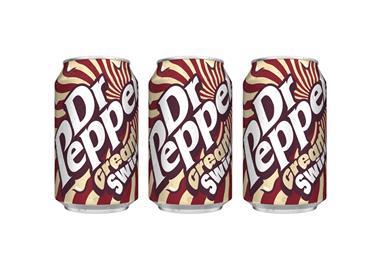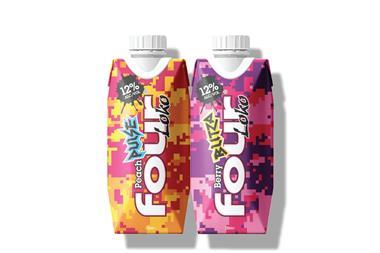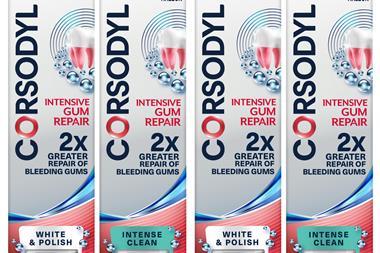Suppliers are condemned by their critics for unhealthy products and unscrupulous marketing. But how much do consumers really need protecting from themselves? Simon Mowbray reports
Junk the food ads’, ‘Schools in choc for kids row’, ‘The 1,000 calorie ice creams’ and ‘Alcoholics set to sue drink firms’. With headlines like these appearing constantly in the nation’s newspapers, it would hardly be surprising if food and drink brand managers and board directors the length and breadth of Britain were feeling a little brow-beaten.
Whether for salt content, fat levels, portion sizes or child-targeted marketing initiatives, virtually all the major producers have found themselves the unwelcome target of media criticism recently.
Take Cadbury, for example. Hardly a novice in the arena of dealing with a vitriolic and health-conscious consumer lobby, the confectionery giant was confident it had come up trumps when it announced a new on-pack summer initiative to give away free sports equipment to schools. The Get Active! drive even had the full support of sports minister Richard Caborn and a significant number of head teachers. Parents seemed to like it, too, with many agreeing it was a jolly good idea provided they managed to keep their kids’ chocolate rationing in check.
However, if ever an initiative showed the fine line between widespread acceptance and a PR disaster, it was Cadbury’s. It took just one smart-arse at a scare-mongering campaign group to whip the national press into a frenzy.
‘How eating 170 chocolate bars wins a £10 basketball’ screamed the Daily Mail at its easily-panicked audience, while the Daily Mirror was among the tabloids to point out that pupils would have to munch their way through 5,440 “calorie-packed Cadbury’s treats” to get a volleyball net.
Cadbury has remained defiant, claiming it was “very proud” of its “very positive attempt to address childhood inactivity” and last month claimed that one in four schools was taking part in the scheme.
Cadbury Schweppes chairman John Sunderland certainly appears to be growing a little weary of the general criticism being aimed at his company and, on another subject - soft drinks - was reported to say at last month’s first-half results: “Consumers have a choice of a full range of diet drinks. There are scare stories, but everything is labelled.”
It was a rare comment in an age when certain manufacturers don’t want to get involved in mud-slinging matches with the consumer lobby.
As a source at one major manufacturer puts it: “Not everyone wants to get sucked into this debate for fear of stirring up an even bigger hornets’ nest.
“There is a great deal of annoyance within the industry about the level of criticism coming our way, particularly when many of us provide a whole array of products.
“Those include both products which are beneficial to health and others which any right thinking consumer realises should only be eaten as a special treat. Our worry is that this criticism is getting out of control, to the point where there is a fear that responsibility could one day be taken away from the consumer all together.”
United Biscuits, which owns McVitie’s, is among those not scared to take a public stand. “Groups like the Food Commission say that people don’t know what they are eating, but just look at our packets,” says a spokesman. “They are full of information, right down to how much fat and how many calories there are in every biscuit.
“It is not news that biscuits contain fat. There has to be a bit of common sense on the part of consumers. In any case, government statistics show that calorific intake is going down so if we are growing fat then it means we are expending less energy. That can hardly be laid at the door of manufacturers.”
Even so, the spectre of consumer absolution from responsibility still looms large. If such a notion sounds far-fetched, just take a look at the US where consumer lawsuits against food and drink manufacturers are cropping up with ever greater frequency. Unilever and Allied Domecq are among those that have been targeted, with lawyers currently warning they will sue unless the manufacturers put obesity warnings on their respective Ben & Jerry’s and Baskin-Robbins ice cream brands.
Closer to home, Glasgow law firm Ross Harper is representing a group of 12 alcoholics who are trying to sue drink manufacturers for failing to warn them of the dangers of drinking alcohol. The solicitor handling the audacious legal bid, Jim Price, has not divulged any details of who specifically could be sued, but the fact that the case, no matter how potentially hopeless, may be brought is still of concern.
Owen Warnock, a partner specialising in food issues at law firm Eversheds, believes the success of such legal action in the UK remains low. “It will be very difficult to put a strong case together in Britain. For example, no-one has even brought a successful case against the tobacco manufacturers on this side of the Atlantic, even though the link with ill health is easy to prove.
“However, I do believe the effects of what is happening in the States could appear in the UK with regard to how products change over time.”
Warnock is not wrong here and it is perhaps no coincidence that the likes of Kraft, Kellogg, Nestlé, Cadbury and United Biscuits have all recently made bold statements about either reducing portion sizes, salt or fat contents of key brands.
Such changes come as no surprise to Bryan Urbick, director of research at the Consumer Knowledge Centre, which provides food manufacturers with information on how consumers perceive the industry. “We have found that consumers tend to go round in circles when it comes to playing the blame game,” says Urbick.
“They start by blaming manufacturers and advertisers for making them buy things, then they blame the government for not clamping down on the nasty manufacturers. Then they admit that they don’t like the healthier options available to them and finally end up blaming themselves.
“No one is saying manufacturers are blameless here, and everyone involved in food manufacturing is obviously out to make money. But our conclusion is that the blame is more of a general societal thing rather than just being down to one group or body.”
Unsurprisingly, the Consumers’ Association does not agree. Campaign team leader for food, Monique Warnock, says: “Some consumers are not capable of making informed choices for themselves. Ultimately, the food industry has so much influence over our choices that it must take responsibility.”
That is not a view shared by multinational giant Unilever. Spokesman David Webster says: “It’s easy to vilify manufacturers, but to move things forward we need to work together and avoid getting into a blame culture which we believe has gone too far.
“Processed foods are part of the real world, with 60% of the population now spending less than 10 minutes preparing their evening meal. We need to recognise that things have changed from 50 years ago.
“It would be a shame if the food industry were seen as the problem rather than part of the solution.”
Junk the food ads’, ‘Schools in choc for kids row’, ‘The 1,000 calorie ice creams’ and ‘Alcoholics set to sue drink firms’. With headlines like these appearing constantly in the nation’s newspapers, it would hardly be surprising if food and drink brand managers and board directors the length and breadth of Britain were feeling a little brow-beaten.
Whether for salt content, fat levels, portion sizes or child-targeted marketing initiatives, virtually all the major producers have found themselves the unwelcome target of media criticism recently.
Take Cadbury, for example. Hardly a novice in the arena of dealing with a vitriolic and health-conscious consumer lobby, the confectionery giant was confident it had come up trumps when it announced a new on-pack summer initiative to give away free sports equipment to schools. The Get Active! drive even had the full support of sports minister Richard Caborn and a significant number of head teachers. Parents seemed to like it, too, with many agreeing it was a jolly good idea provided they managed to keep their kids’ chocolate rationing in check.
However, if ever an initiative showed the fine line between widespread acceptance and a PR disaster, it was Cadbury’s. It took just one smart-arse at a scare-mongering campaign group to whip the national press into a frenzy.
‘How eating 170 chocolate bars wins a £10 basketball’ screamed the Daily Mail at its easily-panicked audience, while the Daily Mirror was among the tabloids to point out that pupils would have to munch their way through 5,440 “calorie-packed Cadbury’s treats” to get a volleyball net.
Cadbury has remained defiant, claiming it was “very proud” of its “very positive attempt to address childhood inactivity” and last month claimed that one in four schools was taking part in the scheme.
Cadbury Schweppes chairman John Sunderland certainly appears to be growing a little weary of the general criticism being aimed at his company and, on another subject - soft drinks - was reported to say at last month’s first-half results: “Consumers have a choice of a full range of diet drinks. There are scare stories, but everything is labelled.”
It was a rare comment in an age when certain manufacturers don’t want to get involved in mud-slinging matches with the consumer lobby.
As a source at one major manufacturer puts it: “Not everyone wants to get sucked into this debate for fear of stirring up an even bigger hornets’ nest.
“There is a great deal of annoyance within the industry about the level of criticism coming our way, particularly when many of us provide a whole array of products.
“Those include both products which are beneficial to health and others which any right thinking consumer realises should only be eaten as a special treat. Our worry is that this criticism is getting out of control, to the point where there is a fear that responsibility could one day be taken away from the consumer all together.”
United Biscuits, which owns McVitie’s, is among those not scared to take a public stand. “Groups like the Food Commission say that people don’t know what they are eating, but just look at our packets,” says a spokesman. “They are full of information, right down to how much fat and how many calories there are in every biscuit.
“It is not news that biscuits contain fat. There has to be a bit of common sense on the part of consumers. In any case, government statistics show that calorific intake is going down so if we are growing fat then it means we are expending less energy. That can hardly be laid at the door of manufacturers.”
Even so, the spectre of consumer absolution from responsibility still looms large. If such a notion sounds far-fetched, just take a look at the US where consumer lawsuits against food and drink manufacturers are cropping up with ever greater frequency. Unilever and Allied Domecq are among those that have been targeted, with lawyers currently warning they will sue unless the manufacturers put obesity warnings on their respective Ben & Jerry’s and Baskin-Robbins ice cream brands.
Closer to home, Glasgow law firm Ross Harper is representing a group of 12 alcoholics who are trying to sue drink manufacturers for failing to warn them of the dangers of drinking alcohol. The solicitor handling the audacious legal bid, Jim Price, has not divulged any details of who specifically could be sued, but the fact that the case, no matter how potentially hopeless, may be brought is still of concern.
Owen Warnock, a partner specialising in food issues at law firm Eversheds, believes the success of such legal action in the UK remains low. “It will be very difficult to put a strong case together in Britain. For example, no-one has even brought a successful case against the tobacco manufacturers on this side of the Atlantic, even though the link with ill health is easy to prove.
“However, I do believe the effects of what is happening in the States could appear in the UK with regard to how products change over time.”
Warnock is not wrong here and it is perhaps no coincidence that the likes of Kraft, Kellogg, Nestlé, Cadbury and United Biscuits have all recently made bold statements about either reducing portion sizes, salt or fat contents of key brands.
Such changes come as no surprise to Bryan Urbick, director of research at the Consumer Knowledge Centre, which provides food manufacturers with information on how consumers perceive the industry. “We have found that consumers tend to go round in circles when it comes to playing the blame game,” says Urbick.
“They start by blaming manufacturers and advertisers for making them buy things, then they blame the government for not clamping down on the nasty manufacturers. Then they admit that they don’t like the healthier options available to them and finally end up blaming themselves.
“No one is saying manufacturers are blameless here, and everyone involved in food manufacturing is obviously out to make money. But our conclusion is that the blame is more of a general societal thing rather than just being down to one group or body.”
Unsurprisingly, the Consumers’ Association does not agree. Campaign team leader for food, Monique Warnock, says: “Some consumers are not capable of making informed choices for themselves. Ultimately, the food industry has so much influence over our choices that it must take responsibility.”
That is not a view shared by multinational giant Unilever. Spokesman David Webster says: “It’s easy to vilify manufacturers, but to move things forward we need to work together and avoid getting into a blame culture which we believe has gone too far.
“Processed foods are part of the real world, with 60% of the population now spending less than 10 minutes preparing their evening meal. We need to recognise that things have changed from 50 years ago.
“It would be a shame if the food industry were seen as the problem rather than part of the solution.”













No comments yet